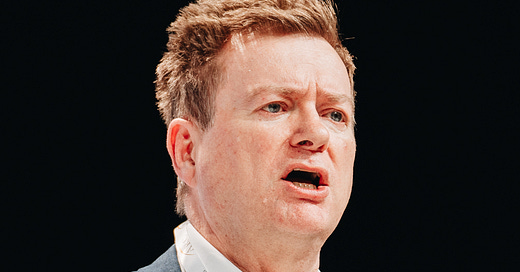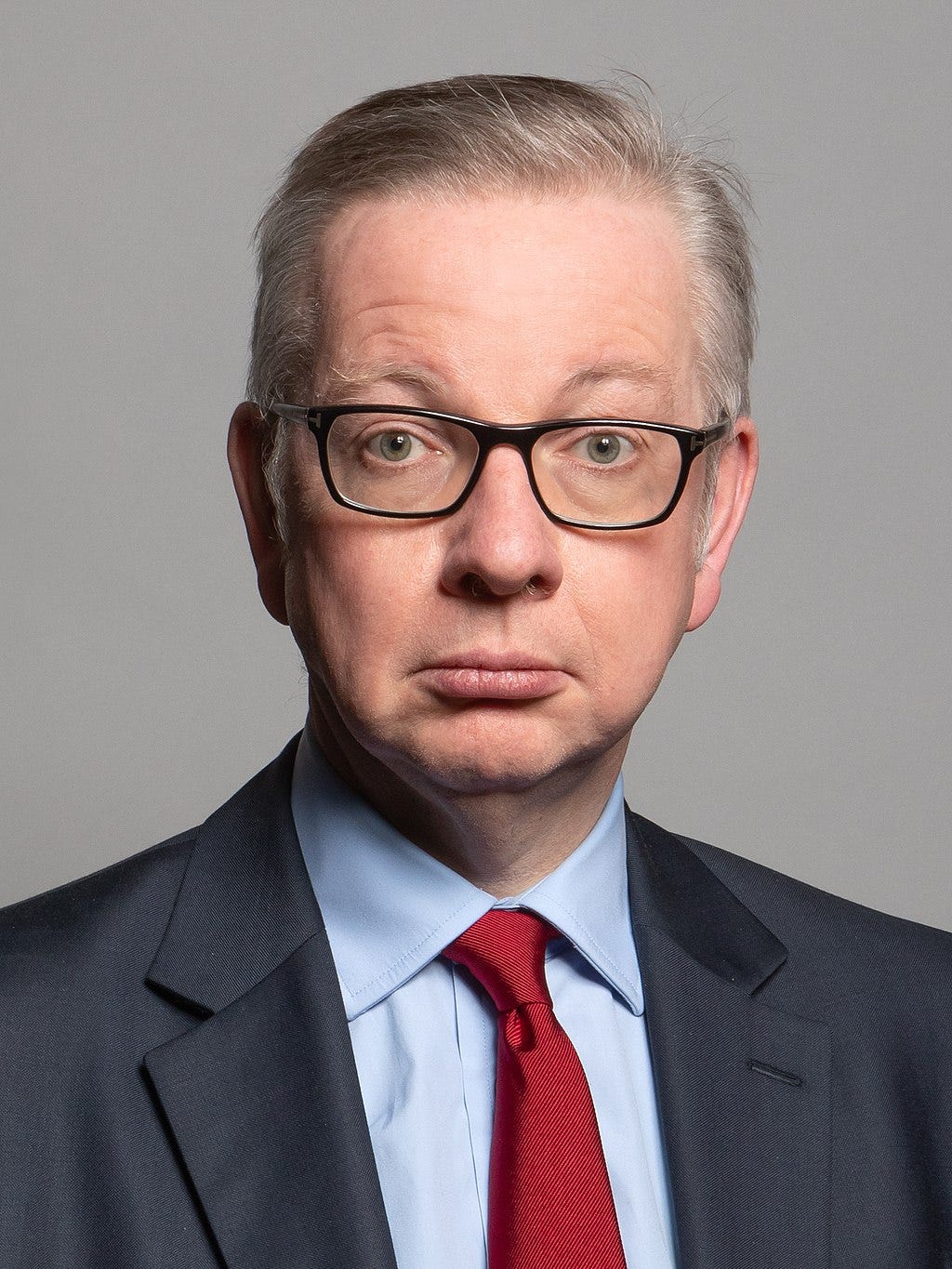We need to talk about Paul (Marshall)
Fears about foreign billionaires buying British politics are justified, but maybe it’s the homegrown super rich we should be worried about?
Last week, GB News hit the headlines, after its latest company accounts showed massive losses at the right-wing broadcaster.
But tucked away on the final page, in the section marked ‘related party transactions’, was a remarkable detail: GB News owes more than £117million to All Perspectives Ltd.
Who, or what, is All Perspectives Ltd? It’s GB News’s parent company—owned by, among others, hedge fund multi-millionaire Sir Paul Marshall.
Marshall has poured tens of millions into GB News since it launched in 2021. He even stepped in as interim chair after founding chairman Andrew Neil resigned, reportedly furious over the channel’s low production quality.
So why is a businessman worth an estimated £875 million seemingly happy to lose a small fortune on GB News? Part of the answer, I suspect, came last month, when the ‘Alliance for Responsible Citizenship’ (ARC) rolled into London.
ARC was hard to ignore. Whether it was Kemi Badenoch warning that “our country and all of Western civilisation will be lost” without a renewed Conservative Party, or the surreal sight of self-styled “professor against political correctness” Jordan Peterson interviewing Nigel Farage, the conference made waves.
For GB News viewers, ARC was even more unavoidable. The channel had dozens of videos and online puff pieces from ‘the anti-Davos’. (For a real taste of what went on, I’d recommend listening to Seth Thevoz’s interview on the Bunker podcast with a journalist who was at an ‘alt-right’ conference afterparty.)
And guess who bankrolls ARC? Paul Marshall.
The most recent accounts for the Sequoia Trust, Marshall’s personal charity, show a £1 million donation to ARC in 2023. I’d be very surprised if he hasn’t given more since.
At ARC, Marshall held a private dinner with right-wing media figures at which he floated the idea of funding a new generation of journalists, according to a report in the Guardian this week.
All of which begs a big question: why has someone who, a decade ago, was best known for funding the Lib Dems and the ill-fated Alternative Vote campaign become a right-wing media mogul bankrolling fringe conservative conferences and Tufton Street think tanks?
I try to answer this in a long essay in the latest issue of the London Review of Books. It’s based on interviews with dozens of people who know—or knew—Marshall. But in this newsletter I want to focus on what I think are the most important things to know about a man who is fast becoming one of the most influential figures in British politics.
‘I didn’t even know he was religious’
Most who know Paul Marshall agree that his worldview has been shaped by Holy Trinity Brompton (HTB), the evangelical church in west London where he has worshipped since 1997. HTB is influential, with a £10 million annual budget and high-profile congregants like Bear Grylls and Tory donor Ken Costa.
Marshall has donated tens of millions to HTB and its evangelical offshoots, making him one of the Anglican Church’s biggest funders today. But his views are far from mainstream Anglicanism.
He has written that modern society’s ills stem from the Enlightenment and ‘critical theory’ (or, as he calls it, “the bastard child of postmodernism and Frankfurt School post-Marxism”.) Marshall sees “wokery” everywhere: “the media, publishing, newsrooms, Hollywood, football commentators, public administration, HR departments and even Big Tech.”
Opposing ‘progressivism’ is a spiritual mission for Marshall—and an economic one. He believes ‘woke capitalism’ threatens free-market capitalism. “Paul believes this is a civilisational battle,” a former colleague told me. Others have been surprised by his increasingly strident faith. “I didn’t even know he was religious, never mind evangelical,” admitted a former Lib Dem MP.
While the UK lacks the religious right’s political clout seen in the US, there are signs of a hardline Christian influence emerging on the fringes. As theologian Andrew Graystone - who wrote an excellent profile of Marshall for Prospect last year - told me, HTB preaches that its followers are “selected by God to govern.”
Matthew Parris, writing in the Spectator, observed that the ARC conference was “steeped in moral fundamentalism and peppered with references to ‘Judaeo-Christian’ values.” Marshall bought the Spectator last year, for an over the odds £100 million.
Buying media, buying influence
As well the Spectator, Marshall owns the website Unherd and then, of course, there’s GB News. While all these outlets differ, they share core themes: opposition to liberalism, ‘wokery,’ and ‘progressivism.’
It’s a successful formula—UnHerd has twice the traffic of The New Statesman, and GB News recently outperformed Sky News in ratings.
GB News is objectively poor quality TV. Sets are shonky. Presenters are partisan. Guests are underprepared. No wonder Andrew Neil said it looks like it was filmed in North Korea.
A friend of Marshall told me they’d be surprised if he watched an hour of GB News a month. But I think that misses the point. GB News doesn’t need to produce content Marshall personally enjoys—it just needs to shape public discourse, pushing it in directions that chime with Marshall’s general worldview.
It is striking, too, that GB News is co-owned by Legatum Ventures. Legatum is owned by the New Zealand-born, Dubai-based, Brexit-backing hedge funder Christopher Chandler. He has a correspondence address in the United Arab Emirates - so would not be entitled to vote in the UK - but Chandler has spent *a lot* of money influencing its politics.
Like Chandler, Marshall has funded right-wing think tanks in Britain: the Sequoia Trust has given Policy Exchange £890,000. Policy Exchange wouldn’t tell me what the cash was for - they never do - but Marshall’s contributions coincided with a slew number of papers and projects devoted to culture-war issues such as free speech in universities, which were often cited approvingly by Conservative government ministers (some of whom had previously worked at Policy Exchange.)
Could Marshall’s right-wing media empire expand even further? Well, a source very close to his media business declined to deny that he remains interested in buying the Telegraph…
Pushing the Lib Dems right
Marshall is often described as a “former Lib Dem donor who fell out with the party over Europe.” But is that accurate? More importantly, what impact did he have on the party?
To find out I talked to *a lot* of Lib Dems. A few things stuck out: first, Marshall never actually gave the Lib Dems that much money: Electoral Commission filings show he gave the party less than £200,00, far less than the half a million he gave the Tories under Boris Johnson.
But what Marshall did have was a lot of influence inside the Lib Dems. He took over the party’s only think tank - the Centre for Reform - and pushed it to the right. On his watch, the rebranded ‘CentreForum’ also switched from policies such as drug legislation to opposing a tax on financial transactions - which would have hit hedge funds like his own, Marshall Wace.
Marshall is best known among Lib Dems for co-editing the infamous Orange Book, which was presented as an attempt to return the Lib Dems to its free market roots. The book advocated policies like replacing the NHS with a social insurance system. As former MP David Howarth told me, “The whole thing was in aid of a right-wing takeover of the party.”
The Orange Book was a PR disaster. But it laid the groundwork for the Lib Dems’ coalition with the Conservatives in 2010. As David Laws later admitted, without the Orange Book, “it is much more difficult to imagine” the coalition forming.
That’s a substantial return on Marshall’s investment.
Banking on Brexit - and Michael Gove
Talk to people who know Marshall and one name comes up again and again: Michael Gove. During the coalition years, when David Cameron refused to fund Gove’s plan to send King James Bibles to schools, Marshall stepped in. He was later appointed a non-executive director at Gove’s Department for Education and then funded Gove’s ill-fated post-Brexit leadership bid.
As a Lib Dem MP during the coalition told me: “When we got into office Paul Marshall was a Lib Dem man. By the time the coalition was over, he was a Gove man.”
Marshall stopped donating to the Lib Dems in 2015. The following year, he received a knighthood and backed Brexit, donating £100,000 to Vote Leave.
Marshall’s support for Brexit surprised some former colleagues. ‘Paul never really talked about Europe,’ according to a Liberal Democrat who worked alongside Marshall at CentreForum. ‘I think it was once Europe got involved in regulating capitalism [after the financial crisis], and regulating his business, that he started to change.’ Perhaps he also thought political turbulence would be good for business: in his book 10½ Lessons from Experience, published in 2020, Marshall wrote that ‘the greatest opportunities always occur around change.
Marshall has given money to many other causes, too. He’s Britain’s biggest philanthropist, donating more than £145 million in 2023, the latest year for which there are financial records.
Among his charitable ventures is Ark (Absolute Return for Kids), which he co-founded in 2002. Ark operates worldwide, including Ark Schools, a network of 39 schools in England.
However, last year, Marshall stepped down as Ark Schools chair after Hope Not Hate reported that his locked X account had liked or reposted far-right, homophobic, and Islamophobic tweets. One tweet Marshall endorsed claimed Muhammad was “one of the worst men to ever live”; another advocated for mass expulsions to preserve European civilisation.
Staff at Ark Schools were “really surprised and angry,” a long-time associate said, adding that he ‘seems to have spent a lot of time in a [social media] bubble’. (A spokesperson for Marshall has said that the sample of posts identified by Hope Not Hate “does not represent his views.”)
What is certain is that Marshall’s donations have become more political in recent years. As well as funding Tufton Street think tanks such as Policy Exchange, in 2022 Sequoia gave £18 million to Ralston College, a private, unaccredited liberal arts college in Savannah, Georgia.
Ralston has just seven academic staff and a handful of students. But its chancellor is well known: ARC frontman (and GB News favourite) Jordan Peterson.
Rumours that Elon Musk intended to give $100m to Reform UK sparked a belated concern with foreign interference in British politics. Labour this week said it was considering “enhanced safeguards against foreign donations.”
That’s good to hear. If our political finance laws are tightened up, could Marshall step into the breach to bankroll Reform instead?
He doesn’t need to: the £80,000 a month GB News pays Nigel Farage to present on the channel is less market rate and more political donation by proxy.
Marshall’s burgeoning media empire, political connections and business acumen, give him far more clout than any donor would have. There are pretty much no rules on media owners using their outlets to push political agendas - even during elections.
Fears about international billionaires buying British politics are justified, but maybe it’s the homegrown multi-millionaries we should be worried about?






It is utterly exhausting, this reactionary takeover by uber wealthy political Luddites.
Thanks for all your hard work Peter.
In addition to being deeply troubled about everything that's going on in the States, I'm really concerned about the looming threat to our democracy in the UK. Labour seems already to be ensnared by rich capitalists and lobbyists and unable to see the danger we are in.
Is there anything that someone like me can do to help you? I feel like putting huge banners up around roundabouts where I live, which is what I did to try and get the Russia report published.